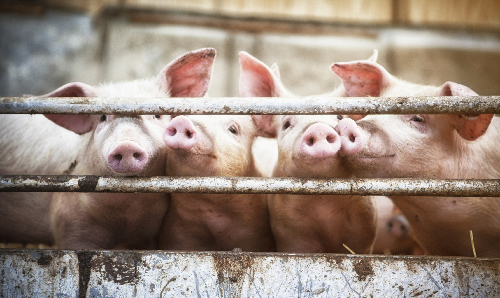A Cambridge University academic is helping improve the global sustainability of pork supplies. Dr Dan Tucker, of the Department of Veterinary Medicine, is a global health assurance consultant to the Pig Improvement Company (PIC), a company specialising in the genetic improvement of pigs, where he’s working to prevent disease and poor health of the animals that can slow progress in bringing improvements in growth, health and sustainability to farmers. His work is helping industry to meet the growing demand for pork worldwide in a sustainable way.
Tucker completed his PhD in Immunology at the School of Clinical Medicine, was introduced to PIC in 2001 and began privately consulting as their pig health specialist for Europe. In 2014, PIC’s COO approached Tucker to explore a closer working relationship. While Tucker was keen to continue working for PIC, he also wanted to carry on his academic research, so he came to Cambridge Enterprise, the commercialisation arm of the University, for advice. Our Consultancy Services team negotiated a contract with PIC, ensuring that he could work for PIC for a fixed number of days each year while also continuing his research at the University.
The connection with industry is two-way, benefitting both industry through access to leading research and the University through opportunities for University staff and funding.
Dr Dan Tucker
PIC is the global leader in delivering healthy genetic improvement to pig industries around the world, benefitting from the latest genomics techniques and quantitative sciences to rapidly select for desirable traits. Improvements range from increasing the number of piglets marketed per sow per year to reducing the amount of feed per kilogram to produce the same amount of meat per kg, and improving resistance to disease.
Tucker’s work for PIC ensures that this breeding is done safely and efficiently at a commercial level. His work focusses on maximising health and minimising disease, making sure that health issues do not interfere with the genetic improvement.
Tucker’s research at the University explores the diagnosis, surveillance, and prevention of bacterial diseases of pigs, including Streptococcus suis, a bacterium carried by all pigs and also able to infect humans. Although mostly harmless, some strains of this bug can cause meningitis in pigs. His research into widespread bacterial infections of pigs could ultimately lead to a reduced reliance on antibiotics.
Animal welfare is an important consideration in pig production, and Tucker liaises with national and international organisations to improve standards in countries that have previously not had effective farm animal welfare legislation in place.
And the benefits of this consultancy project go both ways. Continuing his University role means that Tucker retains access to a unique network of academic knowledge both at Cambridge and other universities, so PIC can continue to innovate.
”The connection with industry is two-way, benefitting both industry through access to leading research and the University through opportunities for University staff and funding,” Tucker said. “The project allows my work to reach the real world and it’s good to see the benefit of my research in real terms.”




